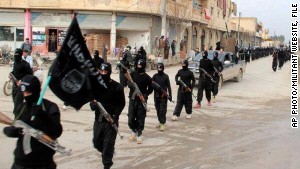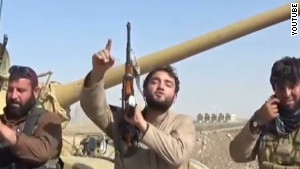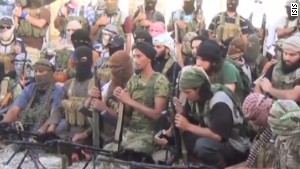U.S. strikes near Baghdad as world searches for anti-ISIS plan
As world leaders struggled to come up with strategies to combat the
threat from ISIS, U.S. military aircraft targeted one of the Islamist
militant group's positions near Baghdad.






An airstrike southwest of
the city Monday appears to be the closest the U.S. aerial campaign has
come to the Iraqi capital since it began last month, a senior U.S.
military official told CNN.
A statement from U.S.
Central Command described the action as "the first strike taken as part
of our expanded efforts beyond protecting our own people and
humanitarian missions to hit (ISIS) targets as Iraqi forces go on
offense, as outlined in the President's speech last Wednesday."
An ISIS "fighting position" that was firing on Iraqi security forces southwest of Baghdad was destroyed, the statement said.
'Any means necessary'

Haines' brother: His life was about love

Anti-ISIS coalition continues to develop

More clues in new ISIS execution video
Meanwhile, more than two
dozen nations, the Arab League, the European Union and United Nations
met in the French capital, calling ISIS a threat to the international
community and agreeing to "ensure that the culprits are brought to
justice."
In a statement at the
conference's conclusion, the French government said the participants had
agreed to take on ISIS "by any means necessary, including appropriate
military assistance, in line with the needs expressed by the Iraqi
authorities, in accordance with international law and without
jeopardizing civilian security."
Meanwhile, the leader of
Iraq's Kurdistan region asked for intensified U.S. airstrikes, saying he
would welcome foreign fighters and urging Iran and the United States to
set aside their differences to fight the Sunni extremists.
Latest beheading
ISIS, which calls itself
the Islamic State, put its brutality on display once again at the
weekend -- posting a video showing the beheading of British aid worker David Haines and threatening the life of another hostage from the United Kingdom.
It was the third
videotaped killing of a Western hostage released in less than a month.
The latest killing, ISIS said, was "a message to the allies of America."
President Barack Obama announced last week
that the United States would lead "a broad coalition to roll back this
terrorist threat" and that U.S. airstrikes against ISIS would expand
from Iraq into Syria.
The United States has said nearly 40 nations
have agreed to contribute to the fight against ISIS, which has seized
control of large areas of northern Iraq and Syria. But it remains
unclear exactly which countries are on that list and what roles they'll
play.
A creaky coalition

Major problems in the fight against ISIS

W.H.: Must strike while iron is hot

Kerry building anti-ISIS coalition
Kerry, who attended the
Paris conference Monday, closed out a Middle Eastern trip on Saturday,
seeking to win support for the U.S.-led anti-ISIS coalition.
In an interview that
aired Sunday on CBS' "Face the Nation," Kerry said some nations "are
clearly prepared to take action in the air alongside the United States
and to do airstrikes, if that's what they're called on to do," but he
did not get more specific.
Some nations have also
offered to commit ground troops, but "we are not looking for that at
this moment anyway," Kerry said in the CBS interview.
Despite the headline
number of around 40 countries offering at least some support, a far
smaller group has made specific and public commitments to join military
action.
"You have a coalition I
would argue of the semi-willing, the disabled, the self-interested and
the self-absorbed," said Aaron David Miller of the Woodrow Wilson
International Center for Scholars. "It's really going to be difficult,
it seems to me, to get everybody focused on the same page."
Former U.S. Ambassador to Iraq James Jeffrey said there were still signs of reluctance among Middle Eastern countries.
"There is true
international consensus and agreement that ISIS is a real problem that
will have to be dealt with," he said. "But there's also, particularly in
the region, great fear of getting too involved."
Kurds want more strikes
Iraqi Kurdistan's
President Masoud Barzani -- whose Peshmerga forces have taken a
significant role in battling ISIS -- told CNN's Anna Coren on Monday
that he has not asked for foreign fighters but would welcome them.
He also called on the
United States to step up airstrikes and said Iran should play a role in
battling ISIS. But that can only happen, he said, if Iran and the United
States "put their differences aside."
Iran has rejected any
cooperation with the United States to combat ISIS in Iraq, Supreme
Leader Ayatollah Khamenei said on his Twitter account Monday. "I
rejected (the) US offer to Iran about ISIS, because US has corrupted its
hands in this issue," the statement read.
Khamanei accused the United States of planning to use military action against ISIS to "dominate the region."










0 comments:
Post a Comment